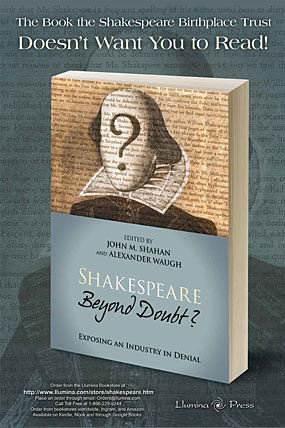Must reading to understand why so many
people have doubts about the Stratford man
The modern-day authorship controversy began in 1857 with the publication of Delia Bacon's The Philosophy of Shakespeare's Plays Unfolded. Since then, hundreds of books have been written on the topic. Since the launch of the Declaration in 2007, at least fourteen new books have appeared, any of which should have been sufficient to legitimize the issue, except orthodox scholars seldom read them. These are on our list of “Fourteen more Recommended.” Here we feature five, plus two recent articles, that we regard as “must reading.”
Shakespeare Was a Woman and Other Heresies: How Doubting the Bard Became the Biggest Taboo in Literature
by Elizabeth Winkler (Simon & Schuster, 2023; $15.59)
Due out in paperback April 23, 2024
“Elizabeth Winkler's Shakespeare Was a Woman and Other Heresies is one of the most engaging, riveting, scholarly, and challenging whodunits anyone with an interest in theater, human psychology, literature, and history can hope to read. Following in the footsteps of Henry James, Mark Twain, Mark Rylance, and innumerable other skeptics, Winkler writes about what has been essentially a centuries old theological dispute about the origins of Shakespeare's astounding body of work like a Shakespearean drama itself: full of complex characters with false reputations and deceptive appearances.”
— Bessel van der Kolk, MD, New York Times bestselling
author of The Body Keeps The Score
“Ben Jonson's 'Sweet Swan of Avon'”
[free PDF from Shakespeare Oxford Fellowship website]
Alexander Waugh (The Oxfordian, Vol. XVI, 2014; 97-103)
Ben Jonson's reference to Shakespeare as the 'Sweet swan of Avon” has long been assumed to refer to the Avon River in Stratford-upon-Avon, and to be proof that the author lived there. But if “Avon” was meant to refer to the river, it should have been “the Avon,” not just Avon. “Avon” by itself suggests a place, not a river. What place could that be? Waugh shows that Hampton Court — the leading venue for Court performances of Shakespeare's plays under both Queen Elizabeth and James I — was long known as “Avon,” as Ben Jonson surely knew. This important fact, which orthodox Shakespeare scholars have overlooked for centuries, severs one of the two connections to the town of Stratford-upon-Avon in the First Folio.
“'Thy Stratford Moniment' — Revisited (Holistic Interpretation)”
(SOF website, March 2015)
Alexander Waugh (revision from an article in the De Vere Society Newsletter, October 2014)
The second connection to Stratford-upon-Avon in the First Folio is Leonard Digges' reference to “thy Stratford moniment.” Indeed, there is a monument to someone called “Shakspeare” in Holy Trinity Church in Stratford. In this article Alexander Waugh decodes the meaning of the monument, revealing it to be part of an elaborate deception orchestrated by Ben Jonson. The monument's strange inscription, rather than confirming Shakspere of Stratford as the author, suggests that the true author is someone else who was secretly buried in Westminster Abbey. This and the previous article are two of the most important in the history of the controversy. Between them, they effectively demolish the last standing pillars of Stratfordian orthodoxy.

Shakespeare Beyond Doubt?<br />Exposing an Industry in Denial
Edited by John M. Shahan and Alexander Waugh
For the Shakespeare Authorship Coalition (2013. In the U.S., Llumina Press, $20.95. In the U.K., Parapress, £13.50)
Unsettled by the success of the Shakespeare Authorship Coalition and its Declaration of Reasonable Doubt About the Identity of William Shakespeare, the Shakespeare Birthplace Trust in Stratford-upon-Avon claims in its book Shakespeare Beyond Doubt that there is “no doubt” that Shakspere of Stratford wrote the works of William Shakespeare. This book questions that claim, and thus its near-identical title, Shakespeare Beyond Doubt? In this devastating reply a dozen top scholars expose the bankruptcy of the SBT claim and challenge them to defend their position under cross-examination in a televised mock trial.
The Man Who Was Never Shakespeare:
The Theft of Shakespeare's Identity
by A.J. Pointon (Parapress, 2011; £12.00)
This book is a good starting place for anyone interested in the issue. Pointon, Professor Emeritus and former Director of Research at Portsmouth University, became interested in the topic while defending the orthodox view in a debate. A trained scientist (physicist and chartered engineer), he brought new eyes to the evidence, finding that many orthodox claims were suspect, or even invented. Pointon restores Shakspere's true identity, and, without claiming to know the true author, points us toward a possible resolution.
Shakespeare's Unorthodox Biography:
New Evidence of an Authorship Problem
by Diana Price (Greenwood Press, 2001; $91.95).
Now in paperback (shakespeare-authorship.com; $19.95)
Price systematically examines the evidence for the Stratford man, compares it to evidence for 24 other writers of his time, and concludes that he did not live a literary life. Indeed, William Shakspere of Stratford is shown to be an extreme outlier in the lack of contemporaneous documentary evidence for his alleged literary career. A tour de force, the book is a great example of the proper interpretation of historical documentary evidence.
The Shakespeare Guide to Italy:
Retracing the Bard's Unknown Travels
by Richard Paul Roe (HarperPerennial, 2011, $13.59)
Roe, a prominent Pasadena attorney, spent over 20 years searching in Italy, his only guide being the texts of Shakespeare's ten Italian plays. He found the location of nearly every scene in all ten plays — locations missed until now because scholars thought the author never left England and only imagined the settings. This brilliant chronicle of travel, analysis and discovery reveals with amazing clarity what Shakespeare saw before writing his Italian plays. (Read a review by former NY Times Arts and Education Reporter William Niederkorn.)
